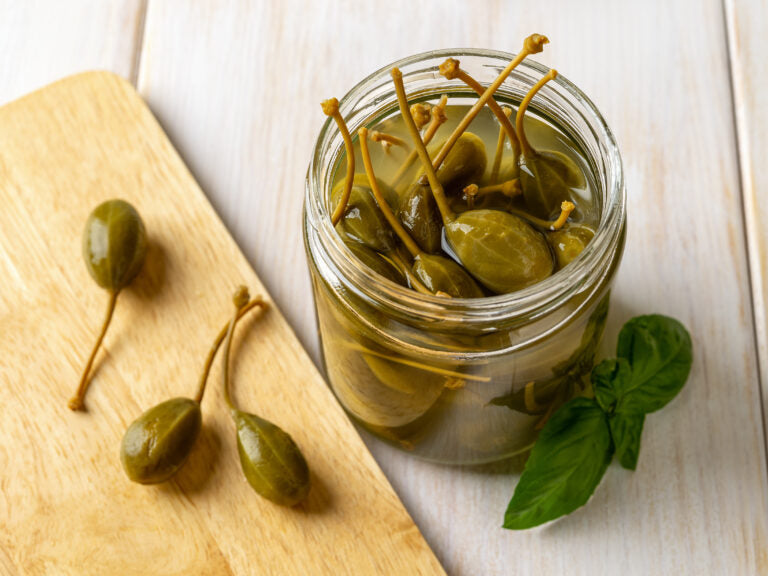What properties do capers have and how can we use them in the kitchen?
Contents:
- Properties of capers
- Contraindications to the consumption of capers
- How do you use capers in everyday cooking?
Capers are the dried, closed flower buds of a plant called spiny capers ( Capparis spinosa L. ). In the kitchen, they act as an aromatic spice with an extremely intense flavor. They come mainly from the Mediterranean, the Middle East, and tropical regions of Asia, as well as Australia. They are an essential culinary ingredient in traditional recipes of Mediterranean, French, and Italian cuisine. But the culinary benefits are not the only advantages of these unassuming, green, pickled spices. Capers are also a source of valuable nutrients.
Properties of capers
Capers were once used in traditional folk medicine for their health-promoting properties. They were primarily used as anti-rheumatics and supported the proper functioning of the liver and digestive system, thus eliminating the feeling of a full stomach. Currently, capers are also said to have diuretic, expectorant, and metabolism-stimulating effects. They also provide the body with vitamins A, C, and K. Capers are also characterized by their particularly high content of polyphenols, i.e. antioxidants such as kaempferol, quercetin, and rutin. Rutin not only seals and strengthens blood vessels, thus facilitating the absorption of nutrients, but also slows the oxidation of vitamin C, thus prolonging its effects. It is an antioxidant that slows the body's aging processes. These small, unopened thorny caper flowers are also high in magnesium, potassium, and sodium.
Capers are especially recommended for people struggling with digestive system problems, including liver problems. They help reduce bloating, relieve intestinal discomfort, and regulate metabolism. Thanks to their high antioxidant content, capers also have a positive effect on the circulatory system. Furthermore, they are extremely low in calories and can therefore be used as part of a weight-loss diet. However, keep in mind that capers increase appetite.
Contraindications to the consumption of capers
Although it is undoubtedly a healthy delicacy, not everyone can eat capers, because in addition to many valuable ingredients, they also provide quite a lot of sodium, which is not recommended for people with hypertension and heart disease, people on a low-sodium diet, people with osteoporosis, but also people with edema and water retention in the body.
How do you use capers in everyday cooking?
Capers have an intense, distinctive flavor. They are quite salty, tart, and sour. They are sometimes compared to the taste of green olives with the addition of horseradish and lemon pepper. It's a very distinctive blend of flavors and aromas. This is why capers go so well with fish dishes, for example, and add a special zest to otherwise bland dishes. They taste particularly good with tuna or salmon, but also with seafood.
• Simple pasta with salmon and capers:
• about 300 g raw salmon,
• 400 g of your favorite pasta,
• a handful of capers,
• 2 cloves of garlic,
• 2 tablespoons olive oil,
• Cream 18%,
• a glass of parsley,
• Lemon juice,
• 80 g grated Parmesan,
• Salt and pepper to taste.
Brown the salmon fillet in olive oil with salt and garlic over medium heat for about 5-7 minutes, then cut into pieces. Cook the pasta in lightly salted water until al dente. Add the cream, the juice of half a lemon, and the cooked pasta to the salmon in the pan. Finally, add the Parmesan cheese, capers, and finely chopped parsley, and season with pepper. You can leave some of the parsley and Parmesan cheese aside for garnish.
• Potato salad with capers and spinach:
• 1 kg potatoes,
• 2-3 tablespoons of olive oil,
• a teaspoon of butter,
• 2 chopped garlic cloves,
• 2 medium onions, finely chopped
• a handful of capers,
• 300 g spinach,
• Juice of half a lemon,
• Salt and pepper.
Cut washed potatoes lengthwise, boil in salted water, and drain. While the potatoes are cooking, heat butter, olive oil, and onions in a pan. After about 5 minutes, add the capers and garlic, and after a minute, add the potatoes and spinach. When the spinach is soft, add lemon juice, salt, and pepper, and you're done.
• Egg paste with capers:
• 6 hard-boiled eggs, cut into cubes,
a teaspoon of capers,
• half a cup of mayonnaise,
• 2 teaspoons of mustard,
• a teaspoon of olive oil,
• chopped garlic clove,
• chopped chives and dill,
• Spices: salt, pepper, a pinch of turmeric,
• a teaspoon of lemon juice,
First, prepare the dressing in a bowl by combining mayonnaise with olive oil, mustard, garlic, lemon juice, capers, and spices. Finally, add chopped eggs, chives, and dill. Mix everything thoroughly.
• Yogurt sauce with capers:
• a glass of natural yogurt,
• a spoonful of capers,
• half a cup of chopped dill,
• half a cup of chopped chives,
• chopped garlic clove,
• Juice of half a lemon,
• Salt and pepper.
THE PUBLISHER'S CHOICE
Dried plums 1 kg BIOGO
- £6.08
- £6.08
- Unit price
- / per
Dried White Mulberries 500 g ORGANIC
- £5.06
- £5.06
- Unit price
- / per
Almonds 1 kg BIOGO
- £10.13
- £10.13
- Unit price
- / per
Cranberries sweetened with apple juice organic 1 kg BIOGO
- £14.19
- £14.19
- Unit price
- / per
Dried dates 1 kg BIOGO
- £3.65
- £3.65
- Unit price
- / per
Unpeeled buckwheat groats 1 kg BIOGO
- £2.44
- £2.44
- Unit price
- / per
Walnuts 800 g BIOGO
- £7.50
- £7.50
- Unit price
- / per
Peeled sunflower seeds 1 kg BIOGO
- £2.64
- £2.64
- Unit price
- / per
PULLED ORGANIC SUNFLOWER SEEDS 1 KG BIOGO
- £3.85
- £3.85
- Unit price
- / per












































































































































